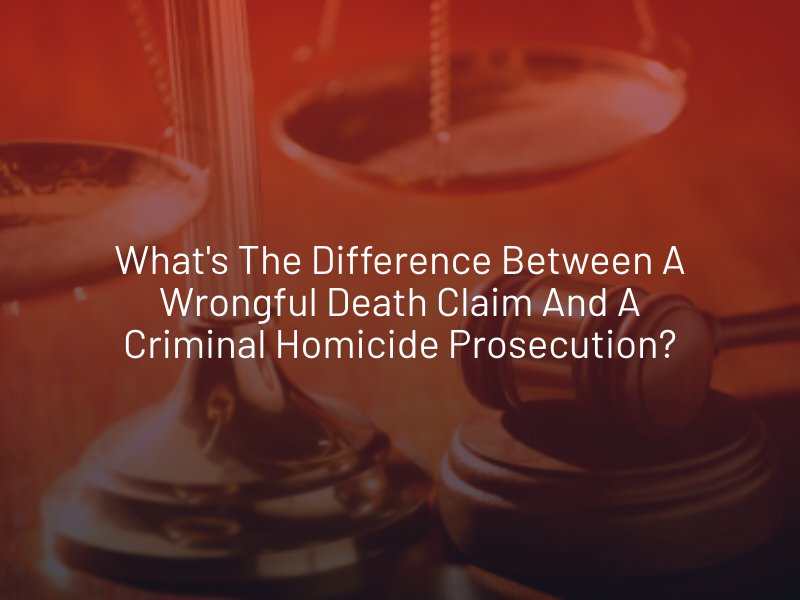What’s the Difference Between a Wrongful Death Claim and a Criminal Homicide Prosecution?
The primary difference between a wrongful death claim and criminal homicide case is that in the latter, a conviction can result in jail or prison time, as well as fines, probation, and more. Whereas, in a successful wrongful death case, the defendant (at-fault party) is liable for damages ordered by the court to be paid to the deceased’s estate.

Other Differences Between Wrongful Death and Criminal Homicide Cases
The criminal justice system is designed to provide accountability for those who harm others. In order to do this, there must be certainty of guilt, which means the prosecutor must prove the defendant was guilty of causing the victim’s death “beyond a reasonable doubt.”
In a civil lawsuit, the burden of proof falls on the deceased’s estate or family member who is claiming damages. However, the bar is set much lower, as the deceased’s estate must only demonstrate liability “by a preponderance of the evidence.” In other words, the defendant was more likely than not responsible for the victim’s death.
In some cases, individuals may be sued for wrongful death while also facing related criminal charges. Although, a person doesn’t need to be charged with criminal homicide or convicted for the surviving family to pursue a wrongful death claim.
The Difference Between Wrongful Death and Murder
Not all wrongful deaths are murders, but murder can be considered a type of wrongful death. Wrongful death is when a victim is killed due to another party’s deliberate or negligent act. When the act is deliberate, it is also murder. Murder is determined by intent. Therefore, when a person is murdered, they were intentionally killed by someone else. When a person is killed due to another party’s reckless or negligent actions, it is only a wrongful death since they did not intend harm.
Can I Sue Anyone Besides the Perpetrator for Murder?
The individual who commits a murder is the obvious defendant to a wrongful death lawsuit, but additional parties who sometimes be held responsible. For instance, if a drunk truck driver causes a fatal truck accident, the trucking company may also be liable if they failed to conduct a thorough background check on its driver. A Las Vegas wrongful death attorney will be able to assess your case, help you determine all potentially liable parties, then discuss your legal options.
Who Can File a Wrongful Death Lawsuit?
Nevada law limits who may file a wrongful death lawsuit to the following:
- The personal representative of the deceased’s estate; and/or,
- The deceased’s “intestate heirs,” which means their surviving family. Surviving family members can bring a wrongful death claim in the following order:
- Surviving spouse or domestic partner
- Children of the deceased
- Parents of the deceased
- Siblings of the deceased
- The closest surviving family member
Even when significant others, fiancés, or close friends are named in a will, they are not allowed by law to pursue a wrongful death claim. There is also a time limit of two years, starting from the victim’s death for a wrongful death to be filed. If the family or personal representative of the deceased’s estate fails to meet this deadline, they will likely be barred from recovering compensation.